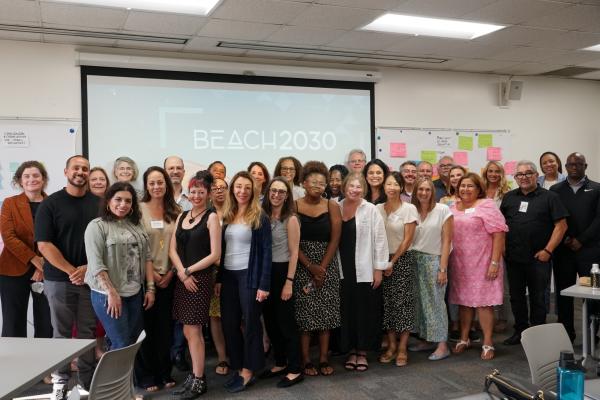Urban Education: A New Strategic Future Focus for College of Education
A collaborative, future-focused workshop was the force that kickstarted the College of Education’s new strategic planning process. As CSULB works to integrate futures thinking into the organizational culture of the university — a key Beach 2030 objective — the college’s newly minted plan serves as a meaningful example of how The Beach is on a path to become a future-ready university.
With a vision to become a leader in the practice of urban education, the College of Education offers a roadmap to achieving this goal with its recently published strategic plan, outlining six aspirations and specific actions to accomplish each one.
For Dean Anna Ortiz, it was important that the college’s goals focus on tangible actions that engage the community and CSULB students as part of its mission.
“I like to use the word ‘practice’ because often Colleges of Ed theorize about urban education — research and write about it — but not actually engage in practice in urban schools, community colleges or universities,” Ortiz said. “I use the phrase because I want our faculty to partner and engage with local schools, working with their students, teachers and leaders to join in their efforts to make sure all students experience an excellent education. I also want our faculty and staff who are preparing our students to be educators to do so with deep knowledge of the methods and dispositions that teachers need to be successful in urban schools.”
To develop a plan that would achieve this, Ortiz and other members of the college in August 2023 engaged in a two-day workshop with the Institute for the Future — a CSULB partner — to explore ideas, hear from experts, and imagine futures in which The Beach is renowned for its leadership in advancing equity and urban education. A faculty member was hired to develop a sourcebook with relevant data and insights on this topic locally, and participants were encouraged to collaborate on a shared vision for the future.

“I really wanted us to stretch ourselves and create a bold and relevant strategic plan to really move us toward meeting the needs of urban education,” Ortiz said. “A lot of times, strategic planning can focus on, ‘what are the projects right now?’ So, I thought the futures thinking process was particularly important for really setting us on track to becoming the leaders in the practice of urban education.”
The process of gathering input from the group of participants — their knowledge, experiences, and outlooks — combined with takeaways from the literature on this topic, “made for a different type of experience than I’ve had before in strategic planning,” Ortiz said. Instead of a top-down approach, the workshop focused on bringing everybody’s ideas and priorities into the conversation.
“It was more powerful because, by the end of the two days, when we’d developed the themes, you couldn’t tell who contributed what, and that’s the ideal,” she said.
This practice continued as the group expanded its outreach to staff and faculty during monthly meetings, where these members of the college were invited to provide feedback and new ideas.
The end result was a product of collaboration, in which many who participated in the process left feeling like the college’s mission reflected their own individual values, Ortiz said.
Because members of all constituent groups were involved in what was written, “people were able to better connect their personal values,” she said.
“I think that when we married the strategic plans with the values, vision, and commitment statement, it made it very easy to see the connection between the values in the strategic plan, and how we’ll hold ourselves accountable.”
Read through the college’s strategic plan on its website.





